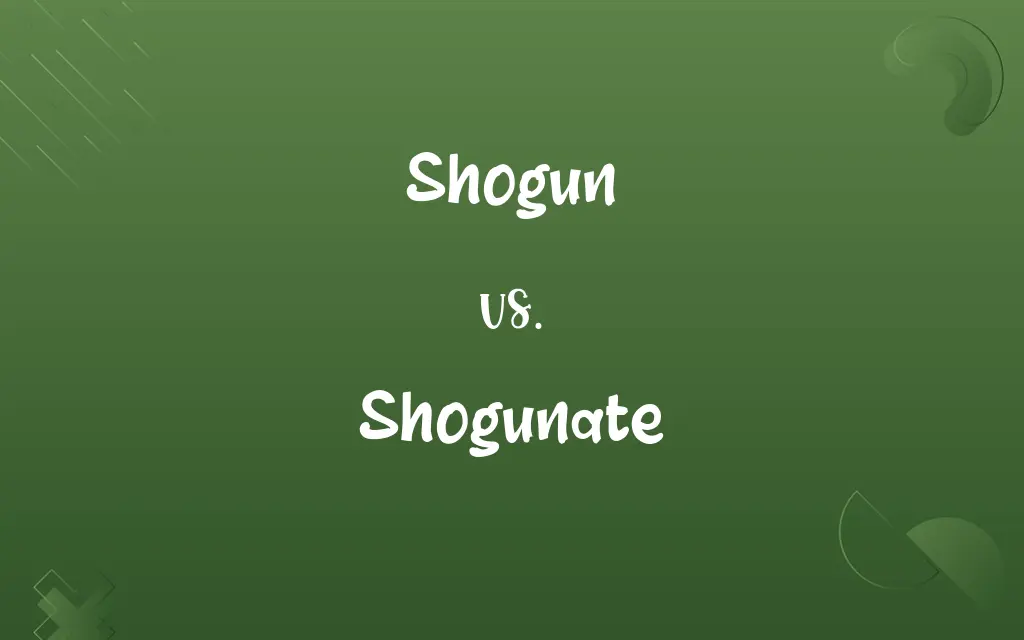Shogun vs. Shogunate: Know the Difference

By Hifza Nasir & Dua Fatima || Updated on March 5, 2024
Shogun refers to a military dictator in Japan before 1868, while shogunate denotes the period or government under shogun rule, emphasizing structure and era.

Key Differences
A shogun was the title given to the military dictators of Japan from the late 12th century until 1868, holding the highest authority in the feudal system. On the other hand, the shogunate refers to the governmental system or the era during which the shoguns ruled, encompassing the political, social, and administrative framework established by the shogun.
Hifza Nasir
Mar 05, 2024
The shogun's power was primarily military and executive, commanding the samurai warrior class and directly ruling the country. Whereas, the shogunate involved a broader administrative structure, including the bureaucracy that managed land, collected taxes, and governed the provinces under the shogun's leadership.
Dua Fatima
Mar 05, 2024
Throughout Japanese history, there were several shogunates, such as the Kamakura, Muromachi, and Tokugawa shogunates, each named after the location of the shogun's headquarters or the ruling family. The term "shogun" is individual-focused, highlighting the leader's role, while "shogunate" emphasizes the period and systemic aspects of governance.
Hifza Nasir
Mar 05, 2024
The appointment of a shogun was a significant political event, often sanctioned by the Emperor, though the real power lay with the shogun. In contrast, the establishment or end of a shogunate marked broader historical transitions, reflecting shifts in political power, social structures, and cultural norms.
Hifza Nasir
Mar 05, 2024
Shoguns were often involved in military campaigns, diplomacy, and securing their rule against internal and external threats. The shogunate, however, represents the institutional mechanisms through which such activities were coordinated and executed, including laws, economic policies, and military strategies.
Hifza Nasir
Mar 05, 2024
ADVERTISEMENT
Comparison Chart
Definition
A military dictator of Japan
The period or government under a shogun
Hifza Nasir
Mar 05, 2024
Historical Significance
Commanded the samurai and held executive power
Encompassed the political and administrative structure
Hifza Nasir
Mar 05, 2024
Examples
Minamoto no Yoritomo, Tokugawa Ieyasu
Kamakura Shogunate, Tokugawa Shogunate
Dua Fatima
Mar 05, 2024
Role in Japanese History
Central figure in military and political leadership
Defined periods of governance and social order
Shumaila Saeed
Mar 05, 2024
ADVERTISEMENT
Shogun and Shogunate Definitions
Shogun
Often came from a powerful samurai family.
Many shoguns were members of the Minamoto clan.
Hifza Nasir
Mar 05, 2024
Shogunate
Encompassed a bureaucratic system.
The shogunate established systems for land management and taxation.
Hifza Nasir
Mar 05, 2024
Shogun
A military dictator of feudal Japan.
Tokugawa Ieyasu became shogun and established a government that lasted over 250 years.
Hifza Nasir
Mar 05, 2024
Shogunate
The governmental period under shogun rule.
The Tokugawa Shogunate was characterized by peace and isolation from the outside world.
Hifza Nasir
Mar 05, 2024
Shogun
Commanded the samurai class.
A shogun would lead his samurai into battle to defend or expand his territory.
Dua Fatima
Mar 05, 2024
ADVERTISEMENT
Shogunate
Marked by specific eras in Japanese history.
The Kamakura Shogunate is known for repelling Mongol invasions.
Dua Fatima
Mar 05, 2024
Shogun
Held the highest authority.
The shogun made key decisions in warfare and governance.
Dua Fatima
Mar 05, 2024
Shogunate
Involved complex relationships with the emperor.
The shogunate had ceremonial acknowledgment from the emperor but held real power.
Hifza Nasir
Mar 05, 2024
Shogun
Symbolized military and political power.
The shogun's approval was crucial for implementing new laws.
Hifza Nasir
Mar 05, 2024
Shogunate
Reflected shifts in power and culture.
The end of the Tokugawa Shogunate marked the beginning of the Meiji Restoration.
Dua Fatima
Mar 05, 2024
Shogun
One of a line of military commanders who from 1192 until 1867 were generally the actual rulers of Japan, although nominally subordinate to the emperor.
Hifza Nasir
Oct 19, 2023
Shogun
A title originally conferred by the Mikado on the military governor of the eastern provinces of Japan. By gradual usurpation of power the Shoguns (known to foreigners as Tycoons) became finally the virtual rulers of Japan. The title was abolished in 1867.
Hifza Nasir
Oct 19, 2023
Shogunate
A form of government in which the ruler is an absolute dictator (not restricted by a constitution or laws or opposition etc.)
Hifza Nasir
Oct 19, 2023
Shogun
A hereditary military dictator of Japan; the shoguns ruled Japan until the revolution of 1867-68
Hifza Nasir
Oct 19, 2023
Repeatedly Asked Queries
What was the role of a shogun?
The shogun was a military leader who held the highest power in feudal Japan, commanding the samurai and governing the country.
Dua Fatima
Mar 05, 2024
What does shogunate mean?
Shogunate refers to the period or governmental system in Japan when the shoguns ruled, including its political and administrative structure.
Hifza Nasir
Mar 05, 2024
Did shoguns have absolute power?
Shoguns held the majority of power in governance and military matters, though they operated within a broader feudal system.
Hifza Nasir
Mar 05, 2024
Can shogun and shogunate be used interchangeably?
No, "shogun" refers to the individual leader, while "shogunate" denotes the period or system of governance under shogun rule.
Hifza Nasir
Mar 05, 2024
How did one become a shogun?
Becoming a shogun involved military prowess, political acumen, and often familial lineage, with formal appointment by the emperor.
Hifza Nasir
Mar 05, 2024
What happened to the shogunate system?
The shogunate system ended with the Meiji Restoration in 1868, which restored imperial rule and modernized Japan's government.
Shumaila Saeed
Mar 05, 2024
Did the shogunate have its own currency?
The shogunate issued currency as part of its economic policies, which varied across different shogunates.
Hifza Nasir
Mar 05, 2024
How did the shogunate impact Japanese society?
The shogunate structured Japanese society, economy, and politics, influencing cultural development and social norms.
Dua Fatima
Mar 05, 2024
What was the first shogunate in Japan?
The Kamakura Shogunate, established in the late 12th century, was the first shogunate in Japan.
Hifza Nasir
Mar 05, 2024
Were there different shogunates?
Yes, several shogunates existed, such as the Kamakura, Muromachi, and Tokugawa, each marking different periods and governing styles.
Shumaila Saeed
Mar 05, 2024
How did the shogunate affect Japan's economy?
The shogunate developed a feudal economy based on agriculture, taxation, and trade, shaping Japan's economic structures.
Dua Fatima
Mar 05, 2024
What was the relationship between the shogun and the emperor?
The shogun held real political and military power, while the emperor had a more ceremonial role during the shogunate periods.
Shumaila Saeed
Mar 05, 2024
Did the shogunate contribute to Japan's isolation?
Particularly the Tokugawa Shogunate contributed to Japan's period of isolation, aiming to maintain stability and control foreign influence.
Shumaila Saeed
Mar 05, 2024
How did samurai relate to the shogun?
Samurai were the warrior class under the command of the shogun, serving as soldiers and sometimes administrators.
Shumaila Saeed
Mar 05, 2024
What led to the fall of the shogunate?
Internal conflicts, pressure from foreign powers, and desire for modernization contributed to the fall of the shogunate.
Shumaila Saeed
Mar 05, 2024
Share this page
Link for your blog / website
HTML
Link to share via messenger
About Author
Written by
Hifza NasirCo-written by
Dua Fatima








































































